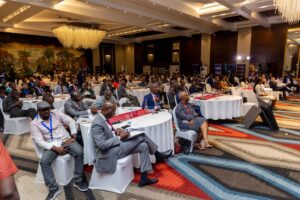Stakeholders and experts at this year’s Ghana Economic Forum (GEF) 2024 emphasised the need for re-engineering the country’s economic model to ensure a robust and resilient economy.
They believe current recovery efforts present a timely opportunity to reshape the economy, making it more sustainable and efficient.
Senior partner at KPMG, Evans Asare, highlighted that by working hand-in-hand with the re-engineering process, the country can create an economy that is better-equipped to withstand future shocks, drive sustainable growth and provide opportunities for all Ghanaians to thrive.
Re-engineering the country’s economic model for sustainable development is critical as the global economy grapples with the aftermath of COVID-19 pandemic, Climate Change and geopolitical tensions.
It is imperative to rethink and reshape current economic strategies to ensure resilient and sustainable growth – especially as significant shifts in supply chain disruptions, artificial intelligence (AI) and other technological advancements continue to redefine economic operations.
“Countries worldwide are re-evaluating their economic models to balance growth with environmental stewardship and social equity. We face our own set of challenges and have our opportunities,” he added.
Indubitably, our economic model must be re-engineered to address pressing issues such as public debt management, economic diversification and the need for robust infrastructure development.
This year’s Ghana Economic Forum (GEF) 2024 was under the theme ‘Unlocking Opportunities: Re-engineering Ghana’s Economic Model for Sustainable Development’ and marked the 13th edition of the flagship programme organised by B&FT.

It brought together a cross-section of experts, policymakers and industry leaders to discuss a new course for Ghana’s economic future.
A Senior Partner of AB & David Africa – a pan-Africa business-law firm – David Ofosu-Dorte, underscored the current lack of cohesion between financial sector players and regulators, the manufacturing industry and sector ministries, as well as policymakers creating a mismatch that is hurting the consumption of locally produced goods.
He asserts that external factors have always impacted the nation adversely due to government’s over-reliance on foreign direct investment, while failing to protect localised FDIs once they establish – a reason that he believes has caused most of them to fold-up within five years of their inception and move to neighbouring countries.
“The need to change our mindset is central not only to the economy but the very sustenance of our business ecosystem, otherwise we will continue a situation wherein political agenda is greater than the national agenda.”
Agriculture, energy and state-owned enterprises (SOES) were mentioned as being key to the re-engineering drive for rebuilding a sustainable economy
By leveraging advancements in renewable energy, investing in the agriculture value chain and enhancing efficiency in SOEs, the country can build a resilient and dynamic economic foundation toward more inclusive and sustainable growth.
A renowned agronomist and farmer, Dr. Abu Sakara, bemoaned the high transaction cost involved in production as a major bottleneck in the sector – and advised adopting a market-led economic model as the surest way of maintaining a competitive environment for agric businesses to thrive.
He observed that aggregate cost of capital, cost of fuel, transportation, labour, cost of machinery determines whether you are competitive in the marketplace or not; and in most instances it is not the farmer or the researcher who decides these things.
Questioning why the country still struggles with some of the problems facing the agric sector after many years, he criticised the high lending rates available – arguing the need to have a separate window for agriculture-lending in particular.
This will ensure access to more affordable financing to support production and growth in the sector.
“If the nature of your economy is such that it is leaning toward trade and buying and selling, you are going to be using high interest rates because you are using short-term loans. But if the nature of your economy is based on industry and production, you have to use lower interest rates. if you don’t have two different windows and the central bank’s Governor says all of you must use the same window, then you are going to start already at a disadvantage,” he stated.
Dr. Sankara also pushed for more investments in the country’s agriculture infrastructure as part of interventions to reduce transaction costs. One of such interventions, he noted, is investment in water infrastructure to cater for irrigation.
For his part, CEO-Business and Financial Times Dr. Godwin Acquaye, in a call to action, described the ‘Ghanaian Dream’ as a vision of prosperity, equity and opportunity for all citizens.
“The Ghanaian Dream visions a society where hard work, innovation and integrity are rewarded, and our cultural heritage and natural resources are preserved for future generations.”










